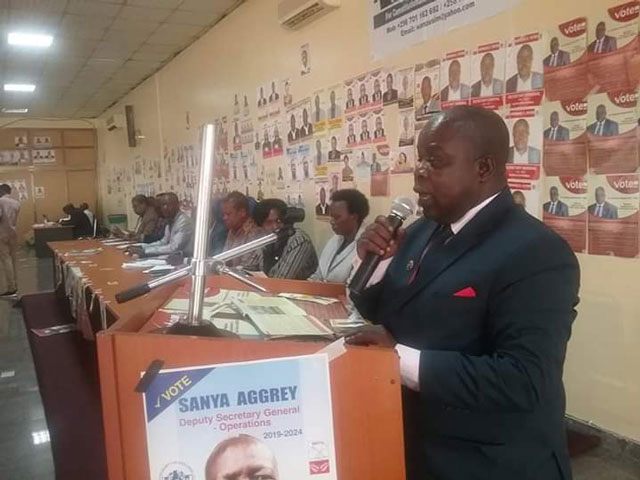
Namutumba, Uganda | THE INDEPENDENT | Labour rights organisations have challenged the government to produce evidence that a functional Minimum Wage Policy discourages foreign investment flows into a country. This has been the main reason for the government’s refusal to review the law that sets a minimum wage, almost 40 years since the last review that set 6,000 Shillings as the lowest that a worker in Uganda should be paid.
Since then, there have been various economic changes including the currency reforms in 1987, varying inflation rates as well as the expansion of the economy more than 12 times. As Uganda joins the rest of the world the commemorate International Labour Day today, civil society has reignited the call for the country to improve its labour laws and policies so that workers, who are the main contributors to the growth of the economy, have more dignified livelihoods.
Robinah Kagoye, the Executive Director, Voices for Labour, reasoned that most of the employment opportunities in Uganda are provided by the informal, small, and medium enterprises, and there is no proof that multinationals have created the desired level of employment despite the incentives they are given.
The CSOs have also called on the government and parliament to expedite the law reforms including the passing of the Employment Amendment Bill, 2022, Employment (Sexual Harassment Regulations, 2012), National Action Plan on Business and Human Rights, among others.
According to them, the continued violation and abuse of workers’ rights in Uganda, including low pay, sexual abuse, and poor working conditions like lack of protective gear, among others, is partly because “there are glaring gaps in labour rights policies and the administration of the existing laws”.
They say this has contributed to the rampant casualization of labour, fissured employment relationships, poor and precarious working terms and conditions, lack of adequate maternity protection, unfair dismissals, low wages, inadequate occupational safety and health, and insufficient social protection. SEATINI, a regional trade and business rights organisation, says that it is unfortunate that even the treaties that the government signs with large investors only favor the investors and not the workers.
Speaking ahead of the Labour Day events scheduled for today in Namutumba District, SEATINI Uganda Policy Analyst Penninah Mbabazi called for a review of the laws to suit the current trends and accord workers, especially on plantations dignified employment.
The Uganda Annual National Labour Force Survey of 2021 revealed that the majority of employed persons (67%) were employed on the basis of oral agreements, meaning that only 33% had written contracts. This makes the majority of Ugandan workers provide labour at the mercy of the employer, without the protection of the law from exploitation, redress in case of rights violations or workplace injuries, or unfair dismissal, among others.
Joseph Byomuhangyi, the coordinator of the Uganda Consortium of Corporate Accountability, says the figures at the Ministry of Gender, Labour at social development showing that 10.3 million Ugandans out of the eligible 23.6 are in real employment is also misleading because of the poor return the workers get.
According to International Labour Organization estimates, every year 2.34 million people die due to occupational fatalities, 2.02 million of which result from work-related diseases, equivalent to 5,500 deaths every day. Uganda’s Annual National Labour Force Survey 2021 showed that 35 percent of the working population was exposed to dust, fumes, or chemicals with proportions of 42 percent in industry, 39 percent in Agriculture, and 39 percent in Services.
This, according to the National Organisations of Trade Unions, NOTU, is made worse by the fact that there is no adequate supervision of workplaces, in addition to the weak laws. Usher Wilson Owere, the Chairman General of NOTU says the labour sector has not been given the attention it deserves, adding that the removal of Pius Bigirimana as Permanent Secretary reversed the reforms that had been embarked on.
Owere also called on streamlining the labour administration in Uganda. He called for the formation of a ministry designed for labour-related issues, instead of having a department that competes for space with women, youth, children, culture, elderly, and persons with disabilities, among others.
He proposed a ministry that combines, workers in the private sector, public sector, and as well as social security, sectors that are related.
The CSOs also wondered why much as each district is mandated to have a labour officer, many districts do not have substantive labour officers in place, while the few available also find it hard to execute their jobs due to underfunding. On the excuse by the government of limited resources, Robert Kirenga, the government’s huge public expenditure is evidence that resources are available, but that unless priorities are set right, there will always be underfunding to the labour sector as the resources go to political appointees like minister, MPs, and advisors.
*****
URN
 The Independent Uganda: You get the Truth we Pay the Price
The Independent Uganda: You get the Truth we Pay the Price





